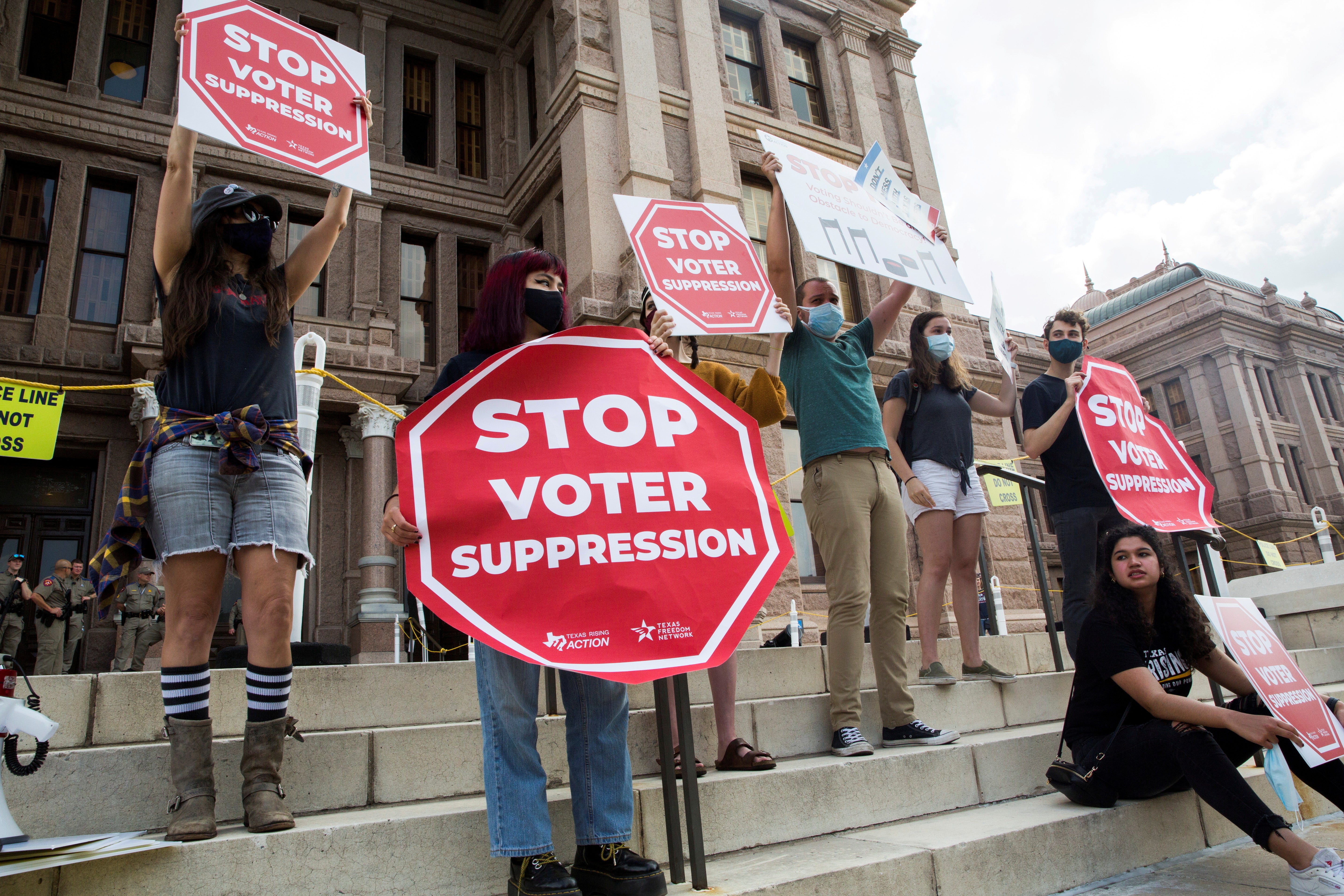What is HR1 and what would the bill mean for voting rights?
Senate to consider sweeping federal election legislation as Republicans endorse dozens of bills to limit ballot access in nearly every state

Your support helps us to tell the story
From reproductive rights to climate change to Big Tech, The Independent is on the ground when the story is developing. Whether it's investigating the financials of Elon Musk's pro-Trump PAC or producing our latest documentary, 'The A Word', which shines a light on the American women fighting for reproductive rights, we know how important it is to parse out the facts from the messaging.
At such a critical moment in US history, we need reporters on the ground. Your donation allows us to keep sending journalists to speak to both sides of the story.
The Independent is trusted by Americans across the entire political spectrum. And unlike many other quality news outlets, we choose not to lock Americans out of our reporting and analysis with paywalls. We believe quality journalism should be available to everyone, paid for by those who can afford it.
Your support makes all the difference.Members of Congress are mulling a sweeping voting rights, election ethics and campaign finance reform bill that could mark one of the largest expansions of voting rights in the US, if passed.
The White House-backed measure – which House Democrats passed as HR1, proposed as the For The People Act – has faced overwhelming resistance from congressional Republicans, as dozens of GOP-supported restrictions on voting and ballot access are proposed in nearly every state.
Democrats have argued that the For The People Act serves as an antidote to those measures, which have largely aimed to strip vote-by-mail options after states saw increased turnout in 2020 elections.
The measure would standardise voting access at the federal level, eliminate long-standing barriers to voting and allow candidates with smaller platforms to wield more political power.
It proposes automatic voter registration, at least 15 consecutive days of early voting for federal elections, and mail-in voting and drop boxes for absentee ballots, among a host of other proposals wrapped into the bill. It would also make it more difficult to purge voters from voter rolls and would restore voting rights to formerly incarcerated people.
The bill has reached a Senate committee for the first time, but it faces a steep climb in an evenly divided Senate.
Republicans have launched a massive campaign of misleading or false claims about the bill’s contents to undermine what’s actually inside it and have accused Democrats of attempting to rig future elections by expanding access to the ballot.
Here is what the bill actually proposes:
Expand voting rights and ballot access to eligible voters
State elections officials would be required to automatically register eligible voters, giving people the option to opt-out of doing so.
Early voting sites in federal elections would be mandated to stay open for at least 15 consecutive days, for 10 hours a day. States would also not be able to restrict voters’ access to mail-in ballots.
The bill also would restore voting rights for formerly incarcerated people convicted of felonies who have completed their sentences. (It does not restore voting rights to people serving sentences.)
In states with voter ID laws, people would be allowed to cast ballots by signing a sworn affidavit if they do not present ID. Voting rights advocates have long argued that onerous voter ID laws have effectively suppressed the votes of African Americans.
Voters also would be allowed to designate a third party to drop off their sealed and signed mail-in or absentee ballot to a post office, ballot drop-off location or other designated elections office, provided that the person is not paid to do so. Republicans have criticised the practice as “ballot harvesting” and eligible for vote manipulation, though the signed and sealed ballot envelopes make it virtually impossible.
End partisan gerrymandering
The bill would create independent redistricting commissions that redraw congressional districts in an effort to combat partisan-driven gerrymandering, in which districts are shaped to ensure one party’s election over another.
The commission would include five Democrats, five Republicans and five independents.
The bill would also open a public comment period for Americans to object to gerrymandering in their districts and create a clear channel for legal challenges.
Expose ‘dark money’ donors and tackle campaign finance reform
Super PACs and “dark money” groups would be required to make their donors public, and social media companies would also be required to disclose funding sources from political ads that appear on their platforms.
The measure would also endorse a constitutional amendment to reverse the decision from Citizens United v Federal Elections Committee, in which the US Supreme Court ruled 5-4 that the First Amendment allows corporations and other outside interest groups unrestricted spending independent expenditures for political communications.
It would also establish a voluntary public financing effort for federal campaigns, using public funds – raised from a percentage of fees and fines from corporate malfeasance cases – to create a 6-1 match for small-dollar donations. The maximum small donation that could be matched would be capped at $200. (It does not use or raise money from taxpayers.)
Sexual harassment lawsuits against members of Congress also would be prohibited from using taxpayer funds in settlements.
Create more transparency and oversight
The president and vice president and candidates for those offices would be required to disclose at least 10 years of tax returns.
The Office of Government Ethics would also be given greater enforcement and oversight powers, including over foreign agents and lobbyists.
Join our commenting forum
Join thought-provoking conversations, follow other Independent readers and see their replies
Comments